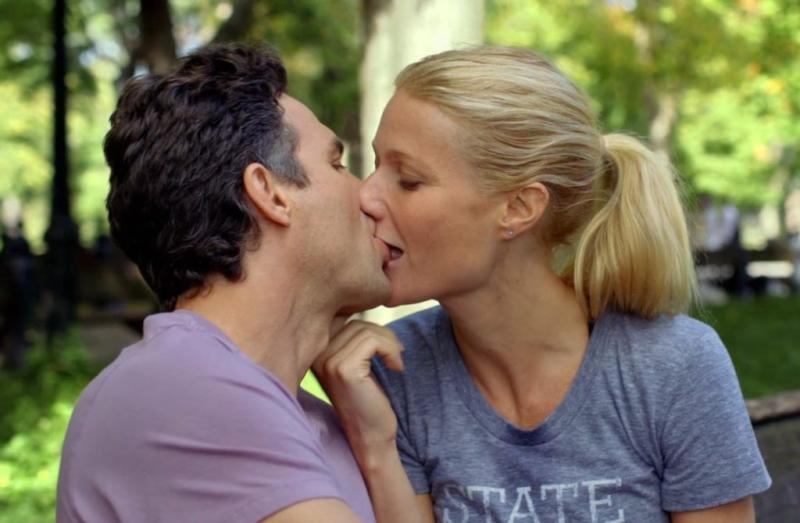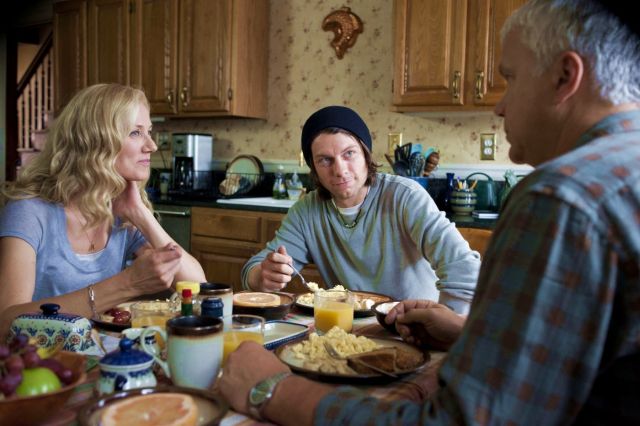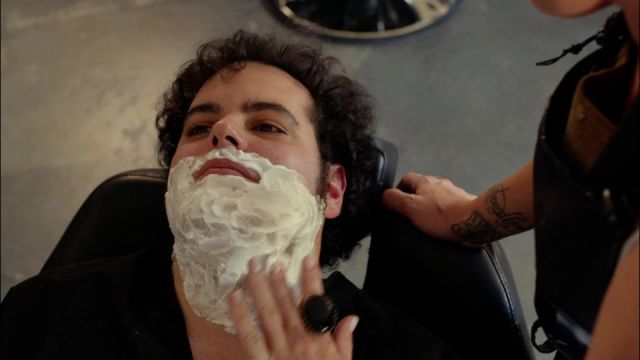Thanks For Sharing | reviews, news & interviews
Thanks For Sharing
Thanks For Sharing
Mark Ruffalo excels as a sex addict in a film that doesn't

The new puritanism of the American cinema continues apace with Thanks For Sharing, which follows on from the more elegantly made but comparably dispiriting Shame in positing Manhattan as the most sexually dysfunctional place on earth. What did New York do (besides elect Michael Bloomberg as mayor three times over) to deserve all this carnal angst and obsessiveness and shame?
Ruffalo plays Adam, a career high-flyer who can barely move in the Big Apple without brazen images of sexuality assaulting him at every turn. For some while, Adam's response had been to take every offer of human sex going (though only hetero mind; unlike Shame, this is a same sex-free zone). These conquests have been arrived at via a series of random pick-ups and prostitutes that has led Adam to the 12-step programme in which he is marking five years of celibacy as the film begins.
 Adam's story is folded in among that of two other men who are going sexual cold turkey alongside him. Mike (Tim Robbins), Adam's sponsor, is a reformed drinker with anger management issues, a quiescent wife (Joely Richardson, in a lovely turn), and a son (Patrick Fugit, pictured right en famille) whose own dependency on drugs builds to a grievous climax that is just one of many plot points that is badly followed through on in Stuart Blumberg and Matt Winston's script. (Blumberg also directed the film, with a lead fist.)
Adam's story is folded in among that of two other men who are going sexual cold turkey alongside him. Mike (Tim Robbins), Adam's sponsor, is a reformed drinker with anger management issues, a quiescent wife (Joely Richardson, in a lovely turn), and a son (Patrick Fugit, pictured right en famille) whose own dependency on drugs builds to a grievous climax that is just one of many plot points that is badly followed through on in Stuart Blumberg and Matt Winston's script. (Blumberg also directed the film, with a lead fist.)
At the same time, Adam is himself sponsor to Neil (Josh Gad, pictured below in the barber chair), a shlub who can no longer take the subway since he can't be trusted not to push himself up against any and all available female flesh: the one good running joke in a punishingly self-serious film arises from Neil's transport problems at ground level, a scenario with which anyone who knows New York traffic will empathise at once. (Let's just say that London even at its most congested is a comparative breeze.) And those who saw Gad's obnoxious if career-grabbing Broadway turn in The Book of Mormon will be pleased to see that the tousled-haired actor is capable of more temperate acting, as well.
 Both Neil and Adam rub up - sorry! - against romance, though of the two, only Neil's arc rings in any way true. He embarks upon what at first looks to be an entirely platonic relationship with a heavily tattooed fellow addict, DeDe, who is played with easy authority by Alecia Moore, better-known as the singing star Pink. Adam, in turn, falls for Gwyneth Paltrow's Phoebe, a putative siren in recovery from cancer whose one dating requirement is that addicts steer well clear. Their fluctuating affections include a lap dance for a lingerie-wearing Paltrow that is enough to dampen anyone's libido for decades to come.
Both Neil and Adam rub up - sorry! - against romance, though of the two, only Neil's arc rings in any way true. He embarks upon what at first looks to be an entirely platonic relationship with a heavily tattooed fellow addict, DeDe, who is played with easy authority by Alecia Moore, better-known as the singing star Pink. Adam, in turn, falls for Gwyneth Paltrow's Phoebe, a putative siren in recovery from cancer whose one dating requirement is that addicts steer well clear. Their fluctuating affections include a lap dance for a lingerie-wearing Paltrow that is enough to dampen anyone's libido for decades to come.
The movie heads to some decidedly dark places and then takes various improbable u-turns, leaving one wondering, for instance, what will become of Becky (Emily Meade, excellent), a damaged pick-up of Adam's who entices him back into the sexual fray. Blumberg wants to be hard-hitting as well as healing, bluntly spoken while allowing the characters the full Hollywood-style reprieve. I believe fully in therapy and the resultant pain but didn't buy this one for a nanosecond. Ruffalo soon appears as an AIDS patient in the screen version of Larry Kramer's era-defining The Normal Heart, which promises a degree of honesty unavailable here. The sharing on this actor's part continues alongside the promise of something genuinely scorching, as well.
The future of Arts Journalism
You can stop theartsdesk.com closing!
We urgently need financing to survive. Our fundraising drive has thus far raised £49,000 but we need to reach £100,000 or we will be forced to close. Please contribute here: https://gofund.me/c3f6033d
And if you can forward this information to anyone who might assist, we’d be grateful.

Subscribe to theartsdesk.com
Thank you for continuing to read our work on theartsdesk.com. For unlimited access to every article in its entirety, including our archive of more than 15,000 pieces, we're asking for £5 per month or £40 per year. We feel it's a very good deal, and hope you do too.
To take a subscription now simply click here.
And if you're looking for that extra gift for a friend or family member, why not treat them to a theartsdesk.com gift subscription?
more Film
 Blu-ray: Wendy and Lucy
Down-and-out in rural Oregon: Kelly Reichardt's third feature packs a huge punch
Blu-ray: Wendy and Lucy
Down-and-out in rural Oregon: Kelly Reichardt's third feature packs a huge punch
 The Mastermind review - another slim but nourishing slice of Americana from Kelly Reichardt
Josh O'Connor is perfect casting as a cocky middle-class American adrift in the 1970s
The Mastermind review - another slim but nourishing slice of Americana from Kelly Reichardt
Josh O'Connor is perfect casting as a cocky middle-class American adrift in the 1970s
 Springsteen: Deliver Me From Nowhere review - the story of the Boss who isn't boss of his own head
A brooding trip on the Bruce Springsteen highway of hard knocks
Springsteen: Deliver Me From Nowhere review - the story of the Boss who isn't boss of his own head
A brooding trip on the Bruce Springsteen highway of hard knocks
 The Perfect Neighbor, Netflix review - Florida found-footage documentary is a harrowing watch
Sundance winner chronicles a death that should have been prevented
The Perfect Neighbor, Netflix review - Florida found-footage documentary is a harrowing watch
Sundance winner chronicles a death that should have been prevented
 Blu-ray: Le Quai des Brumes
Love twinkles in the gloom of Marcel Carné’s fogbound French poetic realist classic
Blu-ray: Le Quai des Brumes
Love twinkles in the gloom of Marcel Carné’s fogbound French poetic realist classic
 Frankenstein review - the Prometheus of the charnel house
Guillermo del Toro is fitfully inspired, but often lost in long-held ambitions
Frankenstein review - the Prometheus of the charnel house
Guillermo del Toro is fitfully inspired, but often lost in long-held ambitions
 London Film Festival 2025 - a Korean masterclass in black comedy and a Camus classic effectively realised
New films from Park Chan-wook, Gianfranco Rosi, François Ozon, Ildikó Enyedi and more
London Film Festival 2025 - a Korean masterclass in black comedy and a Camus classic effectively realised
New films from Park Chan-wook, Gianfranco Rosi, François Ozon, Ildikó Enyedi and more
 After the Hunt review - muddled #MeToo provocation
Julia Roberts excels despite misfiring drama
After the Hunt review - muddled #MeToo provocation
Julia Roberts excels despite misfiring drama
 Ballad of a Small Player review - Colin Farrell's all in as a gambler down on his luck
Conclave director Edward Berger swaps the Vatican for Asia's sin city
Ballad of a Small Player review - Colin Farrell's all in as a gambler down on his luck
Conclave director Edward Berger swaps the Vatican for Asia's sin city
 London Film Festival 2025 - Bradley Cooper channels John Bishop, the Boss goes to Nebraska, and a French pandemic
... not to mention Kristen Stewart's directing debut and a punchy prison drama
London Film Festival 2025 - Bradley Cooper channels John Bishop, the Boss goes to Nebraska, and a French pandemic
... not to mention Kristen Stewart's directing debut and a punchy prison drama
 London Film Festival 2025 - from paranoia in Brazil and Iran, to light relief in New York and Tuscany
'Jay Kelly' disappoints, 'It Was Just an Accident' doesn't
London Film Festival 2025 - from paranoia in Brazil and Iran, to light relief in New York and Tuscany
'Jay Kelly' disappoints, 'It Was Just an Accident' doesn't
 Iron Ladies review - working-class heroines of the Miners' Strike
Documentary salutes the staunch women who fought Thatcher's pit closures
Iron Ladies review - working-class heroines of the Miners' Strike
Documentary salutes the staunch women who fought Thatcher's pit closures

Add comment